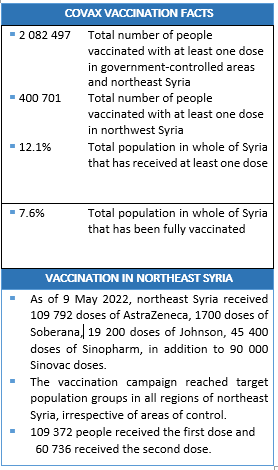 Summary
Summary
As of 9 May 2022, the total number of COVID-19 vaccines delivered to Syria through the COVAX Facility is 11 347 640 doses, in addition to 2 763 640 doses received through bilateral agreements. The available doses will enable Syria to reach about 45.4% of the population.
Between 23 March and 4 April 2022, 1 043 700 doses of AstraZeneca Covishield reached Syria via COVAX. So far, vaccines received from bilateral agreements represent 20% of the total vaccines received, and the remaining 80% were delivered through COVAX.
The vaccines are administered as part of the ongoing national vaccination campaign across the country.
Vaccination process
Vaccination activities continue across Syria at both fixed health facilities and through mobile medical teams in rural areas.
An increase of 44% in the number of administered doses was observed in April compared to March, due to the intensification of vaccination activities at mosques and shopping centres.
The Ministry of Health made vaccines available not only in designated health centres, but also in places where people visit the most. During the month of Ramadan, the implementation of vaccination during Tarawih prayers was carried out at 468 selected mosques in 6 governorates accompanied by workshops for religious leaders in different governorates. In addition, 13 churches, 2 malls and 2 parks were included in these activities.
Readiness for vaccines
Government and northeast Syria vaccination strategy as per the National Deployment and Vaccination Planto deliver vaccines
1037 fixed health facilities, including 43 hospitals and 994 PHC centres
361 mobile teams to cover rural and hard-to-reach areas
In total: 1398 vaccination teams are deployed (5499 health workers)
Northwest Syria
Increasing COVID-19 vaccination teams from 61 to 100 teams: 60 will work as outreach teams, while the other 40 teams will be located as fixed sites in the most populated areas, such as internally displaced persons camps and different cities in northwest Syria.
Priority groups
As per the National Deployment and Vaccination Plan, the vaccination priority groups include all adults over 18 years of age with special emphasis on health care workers, elderly, and people with comorbidities.
Challenges
The late arrival of vaccines makes it difficult for timely implementation of vaccination putting pressure on an already fragile health system. Overall vaccine hesitancy and the short expiry dates of some vaccine shipments create another challenge in achieving high vaccination rates.


